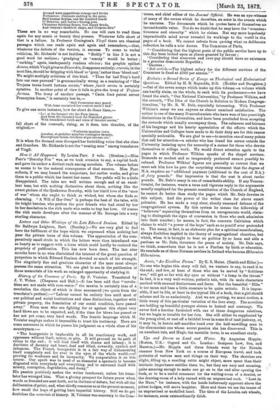History of the Commune of Paris. By P. Vesinier. Translated
by J. V. Weber. (Chapman and Hall.)—It has been said that " revolu- tions are not made with rose-water :" the maxim is certainly true of a revolution the object of which is thus announced (we quote from the translator's preface):—" Labour cannot be entirely free until most of our political and social institutions and class distinctions, together with private property, the foundation of our social condition, have passed away." From men who are fighting for or against this object very hard blows are to be expected, and, if the time for blows has passed or has not yet come, very hard words. The frantic language which M. Vesinier employs makes it impossible to trust his testimony. Here are some sentences in which be passes his judgment on a whole class of his countrymen :— "The bourgeoisie is implacable in all its reactionary work, and oppresses without limit, mercy, or pity. It will proceed on its path of crime to the end ; it will load itself with shame and infamy ; it is destitute of decency and heart, deaf and blind, cowardly, cynical, and infamous. The French bourgeoisie is in a fair way of dishonouring itself completely and for ever in the eyes of the whole world,—of proving its weakness and its incapacity. We congratulate it on this course. Our epoch was in need of so shameful a spectacle to become disgusted with everybody and everything, and to surround itself with misery, corruption, degradation, and decay."
His passion positively makes the writer incoherent, unless his trans- lator has wronged him. What a gloomy prospect for future peace when words so frenzied are sent forth, not in the heat of debate, but with all the deliberation of print; and, what chiefly concerns us at the present moment, how small the hope of getting here impartial history. Still we do get doubtless the materials of history. M. Vesinier was secretary to the Com- mune, and chief editor of the Journal Officiel. He was an eye-witness of many of the scenes which be describes, an actor in the events which he narrates. The documents which he quotes have of themselves no inconsiderable value. Nor do we doubt that he may have the "conscien- tiousness and sincerity" which he claims. But any more hopelessly impracticable mind never revealed its workings to the world in the pages of a book. We cannot refrain from quoting what on deliberate reflection he calls a wise decree. The Commune of Paris,
"'Considering that the highest posts of the public service have up to this day been looked upon as places granted by favour ; Considering that sinecures and over-pay should have no existence in a genuine democratic Republic ; 'Decrees :
'Sole article.—The highest salary for the different services of the Commune is fixed at .£240 per annum.' "


































 Previous page
Previous page